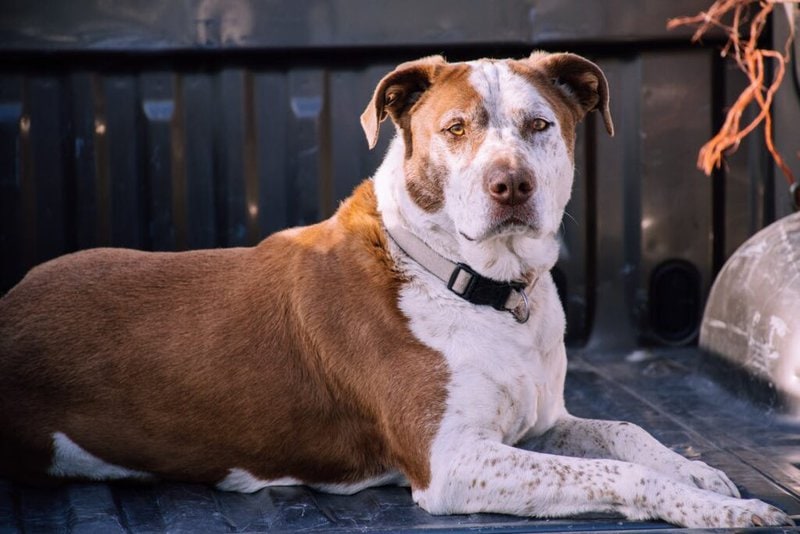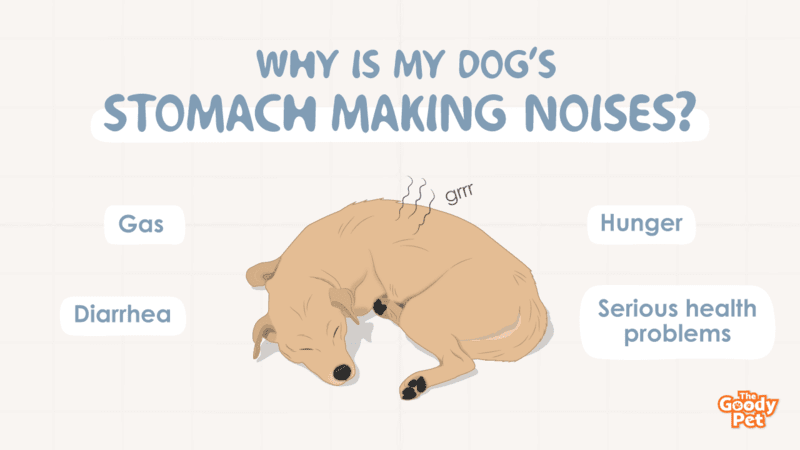When you hear your dog making strange noises, it’s only natural to wonder what’s going on. In some cases, these noises may be cause for concern, but in others, they’re perfectly normal.
There are many reasons why a dog’s stomach might make noises, but the most common reason is gas. Gas can build up for a variety of reasons, such as when a dog eats too quickly, drinks too much water at once, or eats foods that are difficult to digest.
However, it can also be a sign of more serious health problems like gastric dilatation volvulus (GDV), which is a life-threatening condition.
Let’s take a deeper look at what different types of stomach noises dogs make, and what they might mean. So, if you’re curious about your pup’s gastrointestinal health, read on!
Why Is My Dog’s Stomach Making So Many Noises?

Gas
The buildup of gas in the stomach can cause discomfort and may even be painful for your dog. If your dog is experiencing gas, you may notice it trying to fart, making grunting noises, or even whining in pain.
There are a few things that can cause gas in dogs:
- Eating too fast: When dogs eat too fast, they tend to gulp down a lot of air along with their food. This air gets trapped in the stomach and leads to gas.
- Changes in diet: A sudden change in diet can also lead to gas. Dogs’ digestive systems are sensitive, and they need time to adjust to new food. If you switch your dog’s food abruptly, it may cause gas and other digestive problems.
- Eating certain foods: Some foods are more likely to cause gas than others. Foods that contain a lot of fiber, for example, can lead to gas. Other gas-causing foods include soybeans, dairy products, and fatty meats.
Diarrhea
Diarrhea may be another reason why a dog’s stomach makes noises. This, along with severe vomiting, are on the relatively extreme end of possibilities, and both occur when a dog has had something bad to eat, such as when it breaks into the trash or consumes unfamiliar food items.
And yes, in case you were wondering, dogs can catch stomach bugs and viruses just like humans do.
The condition is known as gastroenteritis and can be treated through proper hydration, antidiarrheal medication, and a healthy diet.
Hunger
Ironically, on the opposite end to having too much to eat, not having enough to eat can also be a reason for stomach noises in dogs.
In fact, hunger is one of the most common causes, and a healthy breakfast meal should fix this quite easily.
Others
Lastly, a rumbling dog’s stomach may indicate any of the following: intestinal parasites, foreign bodies, reaction to medications, and inflammatory bowel diseases.
What Are The First Signs Of Bloat In A Dog?

Generally, bloating of a dog’s stomach involves an unusual enlargement of the abdomen.
This can be down to a number of reasons, some of which are related to the reasons given above. Here are a few first signs to be on the lookout for when a dog’s stomach starts to bloat:
Hard Abdomen
At the early stage, a hard abdomen would not be quite visible, especially for dogs with large stomachs.
For smaller dogs, it may be noticeable without touch, but most times this would require feeling a dog’s stomach to be detected.
Also, for remarkably furry dogs, you may not be able to tell if there’s a distended, or hard abdomen at all.
Restlessness
Bloating is not a comfortable experience, by any means. A dog experiencing bloating, even in the early stages, will most likely become so uncomfortable that it starts prancing restlessly.
In the latter stages, however, the restless prancing dies down and gives way to weakness and lethargy.
Fast Breathing And Excess Saliva
Dogs at the early stages of a bloated stomach onset will start to breathe rapidly, and heavily. This is due to the decrease in air space around the chest, blocked by whatever is causing the bloating.
They also tend to produce a lot more saliva than usual.
Fruitless Retching
Trying to vomit, and making vomiting noises without having any food particles come out (or having just a tiny fraction) is another obvious sign that there is something wrong with a dog’s stomach.
Other signs include rapid pulse rate, constant farting, and pale mucus tissue.
Why Does My Dog Have Horrible Gas?

There are quite a lot of reasons why your furry friend may develop an unhealthy amount of gas.
One thing that is common to all, however, is that they involve a buildup of hydrogen sulfide in the stomach region thanks to the abnormal functioning of one or more agents involved in successful digestion.
Below are a few overarching reasons that may explain why a dog suddenly develops horrible gas:
Swallowing Excess Air
Just as it is in humans, it is also possible for a dog to unknowingly swallow a lot of air, thereby leading to a bloated stomach.
A dog swallowing excess air is usually a product of eating too much, too quickly. It can be helped by making use of special feeding dishes that encourage slow consumption or employing a feeding routine that involves calculated breaks.
Bad Food
Horrible gas buildup in the stomach may also occur as a result of consuming bad food – food from the trash, unfamiliar food, or food with certain ingredients known to cause gas buildup in the stomach.
Examples of such foods are leguminous foods or foods that contain oat bran and psyllium.
Excessive stomach gas caused by bad food can be avoided by keeping an eye on what your dog consumes, going for high-quality food, and paying attention to ingredients.
Health Issues
Sadly, in some cases, the underlying causes of stomach gas buildup may be the presence of a health issue, some of which may be mild and easily treatable, like bacterial overgrowth and intestinal parasites, while some such as intestinal tumors and pancreatic complications can be more serious and in need of advanced medical attention.
How Do I Know If My Dog’s Stomach Hurts?

As mentioned earlier, sometimes it is easy to tell when a dog has digestive problems thanks to the physical signs and symptoms that begin to show.
Sometimes, however, the signs are more subtle and, depending on the breed of the dog and the severity of the issue, some may be unable to be detected physically and can be missed completely.
Below are a few of these signs, ranging from the obvious physical ones to the more subtle ones.
Obvious Signs Of Stomach Hurt In A Dog
Vomiting
If your dog begins to vomit consistently over a short period of time, there is definitely something wrong with the digestive system.
Restlessness
Just as it is for a bloated stomach, any sort of discomfort in the stomach region for a dog causes profound restlessness which is expressed through prancing and running around in a worrying fashion.
Flatulence
The excess gas buildup in the stomach would have to be expelled somehow, and the first most, natural way of doing this is through farting.
Burping
Thanks to the abundance of gas in the stomach of a dog with digestive problems, farting alone would not be enough to expel excess gaseous particles, and as such it is not unlikely for the dog to begin to burp offensive gases through the mouth.
Non-Obvious Signs Of Stomach Hurt In A Dog
Depression
Once the excitement stage wears off, a dog with stomach issues may become depressed. This is easy to spot for an otherwise lively dog, but may not be easy to tell for a previously gentle one.
Difficult Stooling
A dog having difficulty whenever it has to “go” is another sign of stomach hurt. Since you may not be aware of when this is happening, though, it may be a little hard to spot.
Blood In Stools
Blood or mucus being present in the feces of a dog is another indication of stomach hurt, but unless you constantly check your dog’s feces for foreign bodies, this may also be a bit hard to spot.
How Can I Settle My Dogs Stomach Gurgling?
In case you were wondering if there was a magical pill that could make the stomach hurt in a dog disappear instantly, well, there isn’t. However, the following items may just do enough to alleviate the issue as quickly as possible.
Probiotics
Probiotics are microorganisms with a lot of positive health effects. They are good kinds of bacteria and can help alleviate stomach trouble in a dog.
Ready Pet Go is our recommended probiotic for this purpose, thanks to its safety, efficacy, and its Impressive concentration (at 5 million CFU per chew).
It is also ideal for dogs of all ages and breeds, so you wouldn’t have to worry about finding the right one for your pup.
Healthy Diet
As noted earlier in the text, excessive buildup of stomach gas can be avoided through a proper diet. An example of a diet particularly great for this purpose is Pet Plate.
Pet Plate is made from all-natural ingredients and is considered rich in all essential nutrients to not only guard against the onset of stomach upsets but also provide the stomach with all it needs to fight them off.
The Pet Plate box also offers a range of options and plans, giving you more flexibility and control over taste and ingredients.
Ice Cubes
Staying hydrated can go a long way in alleviating stomach pain. Ice cubes are great for this purpose.
Fasting
Eating healthy is great, but staying away from eating anything could be just as great, at least for about 12 hours or a day just go clean up the system.
Other Food Items
Do food items like bread and scrambled eggs help a dog’s stomach upset? Well, the answer to this is yes. In some cases, these food items can indeed help your dog get over its stomach issues.
Over-The-Counter Medications
Pepto Bismol, the over-the-counter medication for human stomach upset, may also be safe for dog use but should be used with care. If unsure how to do this, it is always advisable to visit the vet.
Related Questions
Dog’s Stomach Making Noises Due To Eating Grass:
One of the most common causes of stomach upset in dogs is the consumption of grass. In case this happens to your dog and it starts to show distress, stop feeding for 12 to 24 hours and then introduce a small amount of a healthy diet, like Pet Plate, and enough hydration. In case symptoms don’t go away in a day, consider visiting a veterinarian.
Should I Feed My Dog After Vomiting Yellow Bile?
The first thing to do after your dog vomits yellow bile is to abstain from any more feeding for about 12 hours. Only after then can you start to introduce some hydration and small, easily-digestible foods at regular intervals.
Which Dogs Fart The Most?
Some dogs tend to fart more frequently than others, but there isn’t any objective study to prove this case to be so. For what it’s worth, though, certain dogs do have a reputation for ripping it up more than others. These breeds include English Bulldogs, Boxers, Doberman Pinschers, Golden Retrievers, and Pugs.





